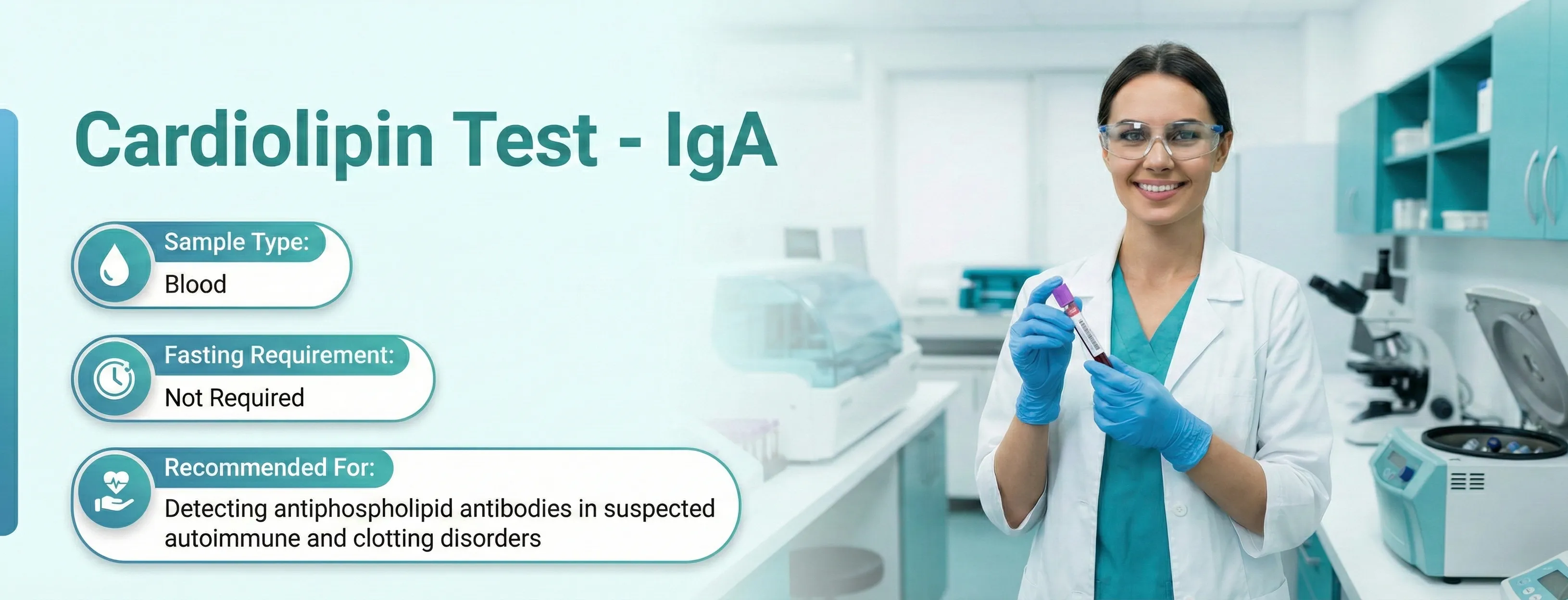4+ orders placed in your location
100% NABL & ISO Certified Lab • 100% Accurate Reports
Cardiolipin Test - IgA
Anticardiolipin Antibodies Test, ACL IgA Antibodies, Anticardiolipin Test, Cardiolipin IgA Test
- SummaryThe Cardiolipin IgA test detects IgA antibodies against cardiolipin, a phospholipid involved in blood clotting. It helps diagnose antiphospholipid syndrome (APS) and related autoimmune conditions, especially in patients with unexplained blood clots, pregnancy complications, or autoimmune diseases like lupus. The test is performed using a blood sample, and fasting is not required. Read more
- Reports Within36 HrsView Sample Report100% NABL & ISO Certified Labs
- SampleBlood
- AgeAll Age Group
- GenderMale and Female
- FastingNot Required
PharmEasy Promises
Know More About The Test
A quick info on Cardiolipin Test - IgA
Overview
The human body is made up of cells, and every cell is surrounded by a cell membrane. The membrane has the substance cardiolipin in it. They are found in a structure called mitochondria, which generate energy for the cell. Cardiolipin helps in the blood clotting process. In certain conditions, our body starts producing antibodies against these cardiolipins. The antibodies are known as anticardiolipin. They are mainly of 3 types, IgA, IgM, and IgG.
The cardiolipin antibody test measures the antibodies against cardiolipin present in the blood. The cardiolipin IgA test is done to measure the IgA subclass of cardiolipin antibodies. The result of the cardiolipin antibody test also helps in the evaluation of Antiphospholipid Syndrome (APS).
The APS is an auto-immune disorder. Here, the immune system mistakenly destroys its body cells by making antibodies against them. Anticardiolipin is mostly detected with other antibodies such as Beta-2 glycoprotein 1 antibody and Lupus anticoagulants.
The cardiolipin antibodies affect the process of blood clot formation. This results in an increased risk of abnormal and frequent blood clots in the arteries and veins. The abnormal blood clots, through blood circulation, can be carried to the lungs, heart, kidney or brain. It can lead to stroke, heart attacks, damage to the lungs (pulmonary embolisms), deep veins of legs (deep vein thrombosis), and recurrent miscarriages.
Symptoms that arise because of cardiolipin antibodies vary depending on the organ affected by the blood clots. Major symptoms are shortness of breath, chest pain, rapid heart rate, migraine, persistent headache, heart attack, frequent unexplained blood clots, recurrent miscarriages, and stillbirth. Cardiolipin antibodies are usually associated with infections like syphilis, HIV, low platelet count, antiphospholipid syndrome, and auto-immune diseases like Lupus Erythematosus.
As per studies, the prevalence of anticardiolipin syndrome varies in different geographical regions. It is affected by ethnic differences and genetics. It is more common in the African region than in the Asia and Indian subcontinent. These antibodies can affect both men and women, but it is most commonly seen in women and older adults.
Other names of the Cardiolipin IgA Test:
- Cardiolipin IgA test
- Antiphospholipid antibodies test
- Antiphospholipid antibody panel
- Anticardiolipin antibodies test
- ACL IgA antibodies
- Anticardiolipin test
What does the test cardiolipin IgA detect/measure, and who is this prescribed for?
The cardiolipin IgA test shows the presence or absence of cardiolipin IgA antibodies in the blood. The test results also show the level of cardiolipin IgA antibodies.
If a person is experiencing the following conditions, a healthcare practitioner may prescribe the cardiolipin IgA test:
- Pain, swelling and discolouration in legs
- Speech changes
- Breathing difficulties
- Repeated headaches or migraines
- Discomfort in arms, neck, and jaw
- Bleeding from nose and gums
- Chest pain
- Increase in heart rate
- Failure of in-vitro treatment
- Stillbirth
- Recurrent miscarriages(especially during 2nd and 3rd trimester of pregnancy)
- Premature labour
For people with such complaints, the cardiolipin IgA test is prescribed by the consulting physician along with other tests.
Some disease conditions for which a doctor can prescribe a cardiolipin IgA test are:
- Autoimmune disorders
- Deep Vein Thrombosis
- Low platelet count
- HIV/AIDS infection
- Lupus erythematosus
- Syphilis
- Stroke
- Heart attack
- Pulmonary embolism
If the result of the cardiolipin IgA test shows a high level of antibodies, the test is repeated after 12 weeks. The result of the confirmatory test and other signs and symptoms of the patient will help the doctor diagnose the underlying medical condition.
The cardiolipin IgA test is applicable for both males and females. Certain medications may interfere with the test results. If you are taking any medicines, inform your doctor about them before taking the test.
Sample Type
The results of the Cardiolipin IgA test are based on the analysis of a blood sample. The cardiolipin IgA test shows the level of cardiolipin IgA in the blood. The result of the cardiolipin antibody test also shows the level of IgA, IgM and IgG antibodies using the same blood sample.
Test Preparation
The cardiolipin IgA test does not require fasting or any specific preparation. The blood sample is collected by inserting the needle into one of the veins, probably the vein of the forearm. This procedure lasts for 2-3 minutes. The collected blood is sent to the laboratory.
Test inclusions: What parameters are included?
The cardiolipin IgA test parameters include the presence or absence of cardiolipin antibody IgA in the body. The result of the cardiolipin IgA test shows the level of antibodies present at the time of the test. It can also be due to any infection or old age.
A repeat test after 12 weeks will help the doctor in determining the diagnosis. The test result is affected by the health status of the person, recent infection, and use of medications like penicillin and syphilis.
The cardiolipin IgA test results can be expressed as positive or negative. The diagnosis will also depend on the presence of other cardiolipin antibodies (IgG and IgM). The doctor may ask you for other tests to detect other antibodies in the blood that are associated with blood clot formation.
How frequently should you take this test?
The consulting physician prescribes the frequency of the cardiolipin IgA test. The doctor may ask you to get tested if you have unexplained blood clots in the body or a history of recurrent blood clots. The doctor may also prescribe the cardiolipin IgA test to women with recurrent miscarriages and stillbirths.
If the cardiolipin IgA test results come positive, the doctor may ask to repeat the test after 12 weeks. The test will determine whether the cardiolipin antibodies are temporary or persistent.
Risk Assessment
Antiphospholipid syndrome, Lupus erythematosus, Pulmonary embolism, Deep vein thrombosis
Ranges
Cardiolipin IgA Range | Result | Interpretation |
<20 U/ml | Negative | No antibodies detected |
>20U/ml | Positive | Antibodies detected |
The normal range of cardiolipin IgA varies from laboratories. It depends on the technique used to determine the result.
If its level is high and the test result is positive in pregnancy, there may be a risk of miscarriage and premature labour. Consult an expert for the same.
Test Result Interpretation
The result of the cardiolipin IgA test is correlated with the cardiolipin IgM and IgG antibody levels to determine the diagnosis. The health status, recent infection, signs and symptoms of the person, and results of all antibody tests will help diagnose the disease.
- A negative (normal level of antibody) result means you don’t have cardiolipin IgA antibodies.
- A positive (high level of antibody) result means you have excess cardiolipin IgA antibodies in the blood.
The antibodies usually fade away sometime after infection. The consulting physician will ask you to repeat the test after 12 weeks. The second test will help to know whether the antibodies are temporary or permanent. If they persist even after 12 weeks, it may be indicative of
- Antiphospholipid syndrome
- Syphilis
- Systemic Lupus Erythematosus
- Behcet’s disease
The test alone cannot lead to any diagnosis. The doctor may prescribe other tests according to the signs and symptoms. Following the diagnosis, the doctor may prescribe the medications and treatment.
Was This Test Information Helpful?
Please rate your experience
References
People Also Ask
What does a positive cardiolipin IgG mean?
What does a high cardiolipin antibody test mean?
What is a cardiolipin blood test used for?
What is a normal anticardiolipin level?
Can cardiolipin antibodies go away?
Have any doubts? Ask us.
Ask us anything about the Cardiolipin Test - IgA to understand it better
We provide trusted, expert-curated health content to support better awareness,prevention, and care.
Backed by experienced doctors, medical experts, and strict editorial standards.


